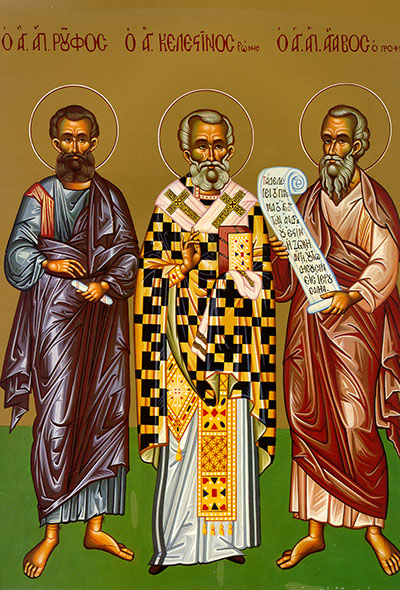

The holy apostles Herodian, Agabus, Rufus, Asyncritus, Phlegon, and Hermas were among the Seventy Apostles. St. Paul mentions them in his epistles. Herodian was a kinsman of Paul. He helped the Apostle Peter in Rome, and was beheaded along with many other Christians the day that St. Peter was crucified. Agabus had a spirit of prophecy; two of his prophecies are recorded in the Acts of the Apostles (11:28 and 21:11). Rufus was bishop of Thebes in Greece. He is mentioned by St. Paul: “Salute Rufus, chosen in the Lord.” (Rom 16:13). St. Asyncritus was bishop of Hyrcania in Asia. Phlegon, who is mentioned in the same place as Rufus, was bishop in the Thracian city of Marathon. Hermas, mentioned with the others, was bishop in Dalmatia.
O holy apostles, intercede with the all-merciful God that He may grant us forgiveness of our sins.
You have become disciples and true apostles of Christ, O glorious Herodian and fellow apostles. Pray to the Lord to forgive the sins of those who honor you.
Acts 3: 19-26
In those days, Peter addressed the people: “Reform your lives! Turn to God, that your sins may be wiped away! Thus may a season of refreshment be granted to you by the Lord when he sends you Jesus, already designated as your Messiah. Jesus must remain in heaven until the time of universal restoration which God spoke of long ago through his holy prophets.” For Moses said: ‘The Lord God will raise up for you a prophet like me from among your own kinsmen: you shall listen to him in everything he says to you. Anyone who does not listen to that prophet shall be ruthlessly cut off from the people.’
“Moreover, all the prophets who have spoken, from Samuel onward, have announced the events of these days. You are the children of those prophets, you are the heirs of the covenant God made with your fathers when he said to Abraham, ‘In your offspring, all the families of the earth shall be blessed.’ When God raised up his servant, he sent him to you first to bless you by turning you from your evil ways.”
John 2: 1-11
At that time there was a wedding feast at Cana in Galilee, and the mother of Jesus was there. Jesus and his disciples had likewise been invited to celebration. At a certain point the wine ran out, and Jesus’ mother told him, “There is no more wine.” Jesus replied, “Woman, how does this concern of yours involve me? My hour has not yet come.” His mother instructed those waiting on table, “Do whatever he tells you.” As prescribed for Jewish ceremonial washings, there were at hand six stone water jars, each one holding fifteen to twenty-five gallons. “Fill those jars with water,” Jesus ordered, at which they filled them to the brim. “Now,” he said, “draw some out and take it to the waiter in charge.” They did as he instructed them. The waiter in charge tasted the water made wine, without knowing where it had come from; only the waiters knew, since they had drawn the water. Then the waiter in charge called the groom over and remarked to him: “People usually serve the choice wine first; then when the guests have been drinking awhile, a lesser vintage. What you have done is keep the choice wine until now.” Jesus performed this first of his signs at Cana in Galilee. Thus did he reveal his glory, and his disciples believed in him.
Icon courtesy of Jack Figel, Eastern Christian Publications – ecpubs.com
Sunday, April 7 –